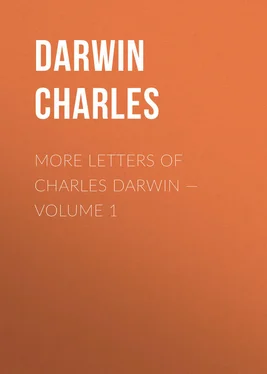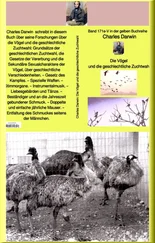Charles Darwin - More Letters of Charles Darwin — Volume 1
Здесь есть возможность читать онлайн «Charles Darwin - More Letters of Charles Darwin — Volume 1» — ознакомительный отрывок электронной книги совершенно бесплатно, а после прочтения отрывка купить полную версию. В некоторых случаях можно слушать аудио, скачать через торрент в формате fb2 и присутствует краткое содержание. Жанр: foreign_antique, foreign_prose, на английском языке. Описание произведения, (предисловие) а так же отзывы посетителей доступны на портале библиотеки ЛибКат.
- Название:More Letters of Charles Darwin — Volume 1
- Автор:
- Жанр:
- Год:неизвестен
- ISBN:нет данных
- Рейтинг книги:4 / 5. Голосов: 1
-
Избранное:Добавить в избранное
- Отзывы:
-
Ваша оценка:
- 80
- 1
- 2
- 3
- 4
- 5
More Letters of Charles Darwin — Volume 1: краткое содержание, описание и аннотация
Предлагаем к чтению аннотацию, описание, краткое содержание или предисловие (зависит от того, что написал сам автор книги «More Letters of Charles Darwin — Volume 1»). Если вы не нашли необходимую информацию о книге — напишите в комментариях, мы постараемся отыскать её.
More Letters of Charles Darwin — Volume 1 — читать онлайн ознакомительный отрывок
Ниже представлен текст книги, разбитый по страницам. Система сохранения места последней прочитанной страницы, позволяет с удобством читать онлайн бесплатно книгу «More Letters of Charles Darwin — Volume 1», без необходимости каждый раз заново искать на чём Вы остановились. Поставьте закладку, и сможете в любой момент перейти на страницу, на которой закончили чтение.
Интервал:
Закладка:
P.S. — Will you by silence give consent to the following?
Linnaeus gives no type to his genus Lepas, though L. balanus comes first. Several oldish authors have used Lepas exclusively for the pedunculate division, and the name has been given to the family and compounded in sub-generic names. Now, this shows that old authors attached the name Lepas more particularly to the pedunculate division. Now, if I were to use Lepas for Anatifera (30/4. Anatifera and Anatifa were used as generic names for what Linnaeus and Darwin called Lepas anatifera.) I should get rid of the difficulty of the second edition of Hill and of the difficulty of Anatifera vel Anatifa. Linnaeus's generic description is equally applicable to Anatifera and Balanus, though the latter stands first. Must the mere precedence rigorously outweigh the apparent opinion of many old naturalists? As for using Lepas in place of Balanus, I cannot. Every one will understand what is meant by Lepas Anatifera, so that convenience would be wonderfully thus suited. If I do not hear, I shall understand I have your consent.
LETTER 31. J.D. HOOKER TO CHARLES DARWIN.
(31/1. In the "Life and Letters," I., page 392, is a letter to Sir J.D. Hooker from Mr. Darwin, to whom the former had dedicated his "Himalayan Journals." Mr. Darwin there wrote: "Your letter, received this morning, has interested me extremely, and I thank you sincerely for telling me your old thoughts and aspirations." The following is the letter referred to, which at our request Sir Joseph has allowed us to publish.)
Kew, March 1st, 1854.
Now that my book (31/2. "Himalayan Journals," 2 volumes. London, 1854.) has been publicly acknowledged to be of some value, I feel bold to write to you; for, to tell you the truth, I have never been without a misgiving that the dedication might prove a very bad compliment, however kindly I knew you would receive it. The idea of the dedication has been present to me from a very early date: it was formed during the Antarctic voyage, out of love for your own "Journal," and has never deserted me since; nor would it, I think, had I never known more of you than by report and as the author of the said "Naturalist's Journal." Short of the gratification I felt in getting the book out, I know no greater than your kind, hearty acceptation of the dedication; and, had the reviewers gibbeted me, the dedication would alone have given me real pain. I have no wish to assume a stoical indifference to public opinion, for I am well alive to it, and the critics might have irritated me sorely, but they could never have caused me the regret that the association of your name with a bad book of mine would have.
You will laugh when I tell you that, my book out, I feel past the meridian of life! But you do not know how from my earliest childhood I nourished and cherished the desire to make a creditable journey in a new country, and write such a respectable account of its natural features as should give me a niche amongst the scientific explorers of the globe I inhabit, and hand my name down as a useful contributor of original matter. A combination of most rare advantages has enabled me to gain as much of my object as contents me, for I never wished to be greatest amongst you, nor did rivalry ever enter my thoughts. No ulterior object has ever been present to me in this pursuit. My ambition is fully gratified by the satisfactory completion of my task, and I am now happy to go on jog-trot at Botany till the end of my days — downhill, in one sense, all the way. I shall never have such another object to work for, nor shall I feel the want of it...As it is, the craving of thirty years is satisfied, and I now look back on life in a way I never could previously. There never was a past hitherto to me. The phantom was always in view; mayhap it is only a "ridiculus mus" after all, but it is big enough for me...
(PLATE: T.H. HUXLEY, 1857. Maull & Polyblank photo., Walker & Cockerell ph. sc.)
(32/1. The story of Huxley's life has been fully given in the interesting biography edited by Mr. Leonard Huxley. (32/2. "Life and Letters of Thomas Henry Huxley." London 1900.) Readers of this book and of the "Life and Letters of Charles Darwin" gain an insight into the relationship between this pair of friends to which any words of ours can add but little. Darwin realised to the full the essential strength of Mr. Huxley's nature; he knew, as all the world now knows, the delicate sense of honour of his friend, and he was ever inclined to lean on his guidance in practical matters, as on an elder brother. Of Mr. Huxley's dialectical and literary skill he was an enthusiastic admirer, and he never forgot what his theories owed to the fighting powers of his "general agent." (32/3. Ibid., I., page 171.) Huxley's estimate of Darwin is very interesting: he valued him most highly for what was so strikingly characteristic of himself — the love of truth. He spoke of finding in him "something bigger than ordinary humanity — an unequalled simplicity and directness of purpose — a sublime unselfishness." (32/4. Ibid., II., page 94. Huxley is speaking of Gordon's death, and goes on: "Of all the people whom I have met with in my life, he and Darwin are the two in whom I have found," etc.) The same point of view comes out in Huxley's estimate of Darwin's mental power. (32/5. Ibid., II., page 39.) "He had a clear, rapid intelligence, a great memory, a vivid imagination, and what made his greatness was the strict subordination of all these to his love of truth." This, as an analysis of Darwin's mental equipment, seems to us incomplete, though we do not pretend to mend it. We do not think it is possible to dissect and label the complex qualities which go to make up that which we all recognise as genius. But, if we may venture to criticise, we would say that Mr. Huxley's words do not seem to cover that supreme power of seeing and thinking what the rest of the world had overlooked, which was one of Darwin's most striking characteristics. As throwing light on the quality of their friendship, we give below a letter which has already appeared in the "Life and Letters of T.H. Huxley," I., page 366. Mr. L. Huxley gives an account of the breakdown in health which convinced Huxley's friends that rest and relief from anxiety must be found for him. Mr. L. Huxley aptly remarks of the letter, "It is difficult to say whether it does more honour to him who sent it or to him who received it." (32/6. Huxley's "Life," I., page 366. Mr. Darwin left to Mr. Huxley a legacy of 1,000 pounds, "as a slight memorial of my lifelong affection and respect for him."))
LETTER 32. TO T.H. HUXLEY. Down, April 23rd, 1873.
My dear Huxley
I have been asked by some of your friends (eighteen in number) to inform you that they have placed, through Robarts, Lubbock & Co., the sum of 2,100 pounds to your account at your bankers. We have done this to enable you to get such complete rest as you may require for the re-establishment of your health; and in doing this we are convinced that we act for the public interest, as well as in accordance with our most earnest desires. Let me assure you that we are all your warm personal friends, and that there is not a stranger or mere acquaintance amongst us. If you could have heard what was said, or could have read what was, as I believe, our inmost thoughts, you would know that we all feel towards you, as we should to an honoured and much loved brother. I am sure that you will return this feeling, and will therefore be glad to give us the opportunity of aiding you in some degree, as this will be a happiness to us to the last day of our lives. Let me add that our plan occurred to several of your friends at nearly the same time and quite independently of one another.
My dear Huxley, Your affectionate friend, CHARLES DARWIN.
LETTER 33. TO T.H. HUXLEY.
(33/1. The following letter is one of the earliest of the long series addressed to Mr. Huxley.)
Читать дальшеИнтервал:
Закладка:
Похожие книги на «More Letters of Charles Darwin — Volume 1»
Представляем Вашему вниманию похожие книги на «More Letters of Charles Darwin — Volume 1» списком для выбора. Мы отобрали схожую по названию и смыслу литературу в надежде предоставить читателям больше вариантов отыскать новые, интересные, ещё непрочитанные произведения.
Обсуждение, отзывы о книге «More Letters of Charles Darwin — Volume 1» и просто собственные мнения читателей. Оставьте ваши комментарии, напишите, что Вы думаете о произведении, его смысле или главных героях. Укажите что конкретно понравилось, а что нет, и почему Вы так считаете.












